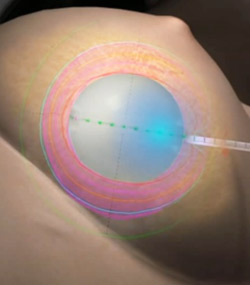
In her twenties, Beverly Treat was a dancer and physically fit. A cancer diagnosis was the last thing she expected to hear from her doctor.
Treat told Ivanhoe, “I didn’t know what he was saying and he got right in my face, ‘Beverly you have to listen’, and I just couldn’t focus.”
Beverly had early-stage breast cancer. Doctors thought she would benefit from a new cancer therapy called intraoperative radiation therapy or IORT.
With IORT, the moment a tumor is removed during surgery, a precise concentrated dose of radiation is delivered into the cavity left behind. That’s it. No additional trips for radiation treatment.
Katherine Kopkash, MD, Breast Surgical Oncologist at Rush University Medical Center in Chicago told Ivanhoe, “A young mother with two kids at home who has to go two hours a day for radiation, a lot of times, these patients get through a week or two and they’re like, I can’t, it’s just too hard.”
IORT isn’t for mastectomy patients. There are minimal side effects, but unlike long-term treatment, fatigue isn’t one of them.
Treat explained, “To me it’s a like a new day for women, that’s what it is. It’s like coming out of some kind of dark ages.”
The single-dose treatment is considered just as effective as traditional radiation. Just as important for Beverly, it means less time at the doctor and maybe more time to get back on the dance floor.
Doctors say there’s no radiation risk to other people after that single dose. A patient could go home and hold a baby, without worrying about passing along radiation.
Contributors to this news report include: Cyndy McGrath, Supervising Producer; Andy Roesgen, Field Producer; Cortni Spearman, Assistant Producer and Jamison Koczan, Editor.